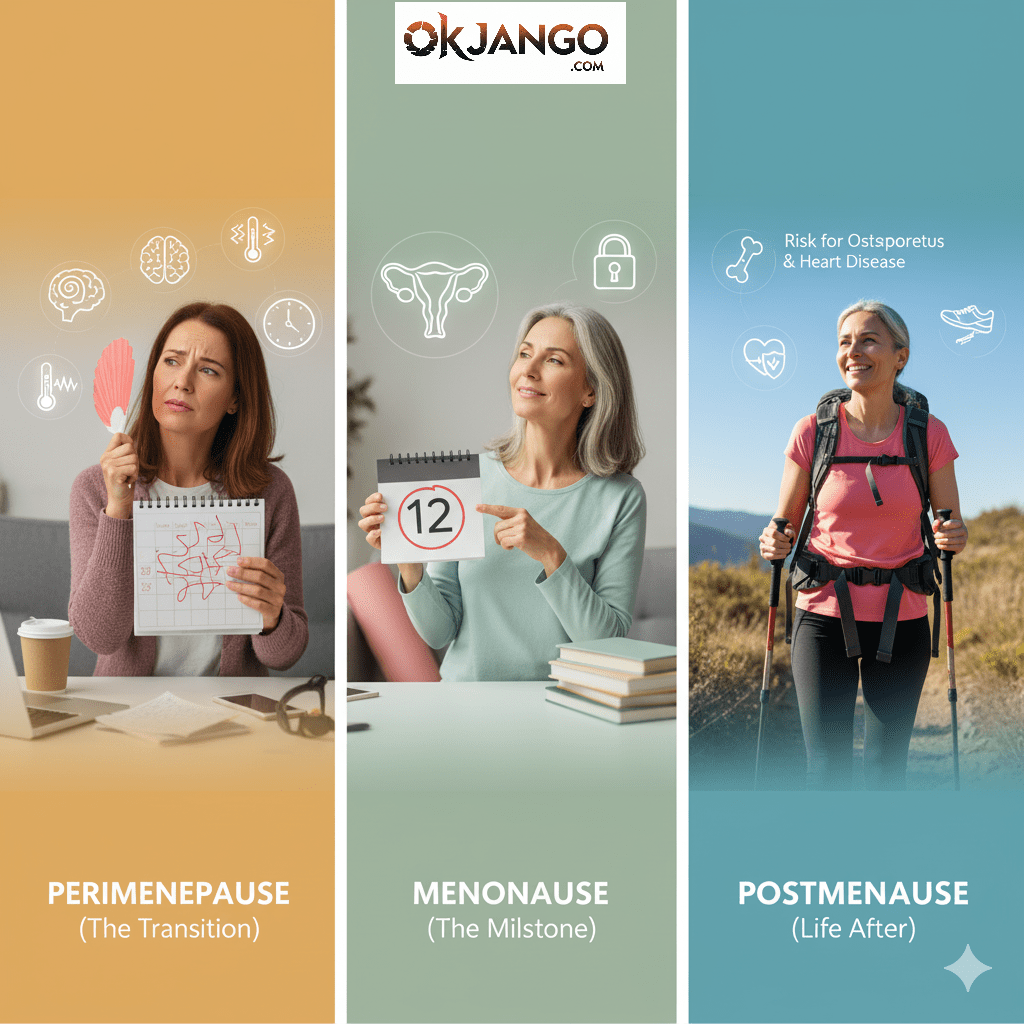Menopause is a completely natural and unavoidable transition in a woman’s life, but it often comes with a veil of mystery and misinformation. It marks the end of the reproductive years, yet for many, it’s also a time of significant personal and physical change.
Understanding what menopause is and how to navigate it is the first step toward embracing this next chapter with confidence and health.
What Exactly is Menopause?
Think of it as the permanent end of a woman’s menstrual periods and fertility. It’s not a switch that flips overnight, but a point in time that’s officially reached when a woman has gone 12 consecutive months without a period, and there is no other medical reason for this change.
This natural transition happens because the ovaries gradually stop producing the reproductive hormones, primarily estrogen and progesterone. It’s a normal part of biological aging, similar to puberty, but in reverse.
When Does Menopause Occur?
The age can vary widely, but for most women, this transition begins between the ages of 45 and 55.
- Average Age: In the United States and many other countries, the average age for reaching official menopause is 51 or 52.
- Early/Premature Menopause: Menopause that occurs before age 45 is considered “early,” and before age 40 is called “premature” menopause (or Primary Ovarian Insufficiency).
The Three Stages of Menopause
The entire journey is broken down into three main stages:
- Perimenopause (The Transition): This stage literally means “around menopause.” It is the time when the body begins its natural shift.
- Start: Can begin 8-10 years before menopause, typically in your mid-to-late 40s.
- Key Feature: Hormone levels (especially estrogen) start to fluctuate wildly. Menstrual cycles become irregular—they may be shorter, longer, lighter, or heavier.
- Symptoms: This is when most women first experience hot flashes, sleep issues, and mood swings. It is still possible to get pregnant during perimenopause.
- Menopause (The Milestone): This is the single, defined point in time.
- Diagnosis: Confirmed after 12 full months without a period.
- Key Feature: Ovaries have stopped releasing eggs and produce very little estrogen.
- Postmenopause (Life After): This is all the time after the 12-month mark of menopause.
- Key Feature: You are no longer fertile. Many of the most bothersome symptoms (like hot flashes) often ease up, but the lower estrogen levels for the rest of your life increase the risk for long-term health concerns like osteoporosis and heart disease.
Common Signs and Side Effects
The symptoms of the menopausal transition are a direct result of fluctuating and eventually declining hormone levels, mainly estrogen. They vary greatly from person to person—some women barely notice them, while others find them severely disruptive.
| Type of Symptom | Common Signs & Side Effects |
| Physical | Hot Flashes (sudden feeling of heat), Night Sweats (hot flashes during sleep), Irregular periods, Vaginal Dryness, Headaches/Migraines, Joint and muscle aches. |
| Emotional & Mental | Mood Swings/Irritability, Anxiety, Difficulty concentrating (“Brain Fog”), Memory lapses, Fatigue, Depression. |
| Long-Term Health | Increased risk of Osteoporosis (bone loss), Increased risk of Cardiovascular Disease, Urinary urgency/incontinence, Weight gain (especially around the abdomen) due to slowed metabolism. |
How Family and Partners Should Support
Menopause is a family issue, not just a woman’s issue. Support from loved ones is crucial for mental and emotional well-being.
- Practice Empathy and Patience: Understand that mood swings, irritability, and anxiety are often physical symptoms driven by hormonal shifts, not personal choices. A partner’s patience during this time can be a huge source of comfort.
- Help with Symptom Management:
- Adjust the thermostat: Since hot flashes and night sweats are common, keep the bedroom cool and encourage dressing in layers.
- Listen actively: Offer a non-judgmental ear. Sometimes just talking about the discomfort, brain fog, or stress helps.
- Encourage Self-Care: Support healthy habits like exercise (which can help with mood and bone health) and a balanced diet.
- Educate Yourself: Learn the facts about menopause. Understanding the biology helps demystify the process and makes it easier to offer practical support.
Frequently Asked Questions (FAQs)
How long do menopause symptoms last?
The duration varies significantly. Perimenopause, the phase with the most noticeable symptoms, typically lasts around 4 to 8 years, but symptoms can begin to subside or change after the official menopause date.
Is weight gain inevitable during menopause?
No, but it is common. The drop in estrogen can cause a slowdown in metabolism, leading to fat being stored more easily, often around the abdomen. A focus on regular exercise and a balanced diet is crucial for weight management during this time.
When should I talk to a doctor about menopause?
You should consult a healthcare provider any time your symptoms are affecting your quality of life, work, or relationships. It’s especially important to see a doctor if you experience bleeding after 12 consecutive months without a period (postmenopausal bleeding) as this requires investigation.
Is Hormone Replacement Therapy (HRT) safe?
HRT is one of the most effective treatments for moderate to severe menopausal symptoms. Its safety depends on an individual’s health history, age, and when the treatment is started. It is essential to discuss your personal risk factors and the various treatment options with a healthcare professional.
Can diet and lifestyle changes help manage hot flashes?
Yes. Simple changes can significantly reduce the frequency and severity of hot flashes.
Weight Management: Studies show that losing weight (if overweight or obese) can help reduce hot flashes.
Identify Triggers: Common triggers include caffeine, alcohol, and spicy foods. Keeping a diary can help you pinpoint yours.
Stay Cool: Dress in layers, use a fan, and keep your sleeping environment cool to manage night sweats.
Does exercise help with menopause symptoms?
Absolutely. Regular exercise is essential, not just for weight, but for overall health during and after menopause.
Heart Health: It helps manage cardiovascular risk, which increases after menopause.
Bone Health: Weight-bearing exercises (like walking, running, or strength training) help combat the estrogen-related decline in bone density and reduce the risk of osteoporosis.
Mood & Sleep: Exercise is a proven tool for reducing anxiety, boosting mood, and improving sleep quality.
What is “brain fog” and how can I fix it?
“Brain fog” is a common symptom in perimenopause and menopause, describing difficulty with concentration, memory lapses, and trouble finding words. It’s linked to fluctuating estrogen levels.
Management: Focus on good sleep hygiene, incorporating omega-3 fatty acids (found in fish/flaxseed) into your diet, and engaging in brain-stimulating activities. For persistent issues, consult your doctor.
Is there a “menopause diet” I should follow?
While there’s no single magic diet, focusing on a Mediterranean-style eating pattern is highly recommended.
Phytoestrogens: Some women find relief by eating foods rich in phytoestrogens, like soybeans, tofu, and flaxseeds, which are plant compounds that weakly mimic estrogen.
Key Focus: High intake of fruits, vegetables, whole grains, and healthy fats (like olive oil and fish).
Support Bones: Increase intake of calcium and Vitamin D (dairy, leafy greens, fortified foods) to protect against bone loss.
How can I find emotional or peer support during this transition?
Connecting with others can be incredibly helpful.
Specialists: Consider seeking a healthcare provider who is a certified menopause practitioner for specialized, holistic care.
Support Groups: Look for online or in-person menopause support groups in your community or through health organizations.
Therapy: Cognitive Behavioral Therapy (CBT) has been shown to be effective in managing symptoms like anxiety, mood swings, and sleep issues.
Relevant Reference Links
- The Menopause Society (formerly The North American Menopause Society – NAMS): Provides evidence-based information, resources, and a searchable database to find a menopause practitioner.
The Menopause Society - National Institute on Aging (NIA) – Menopause Information: Reliable information from a part of the U.S. National Institutes of Health.
What Is Menopause? | National Institute on Aging - Mayo Clinic – Menopause: Comprehensive details on symptoms, causes, diagnosis, and treatment options.
Menopause – Symptoms and causes – Mayo Clinic
Disclaimer: The information provided in this blog is for general knowledge and informational purposes only, and does not constitute medical advice. It is essential to consult with a qualified healthcare professional for any health concerns or before making any decisions related to your health or treatment.
Read more blogs at OkJango.com

